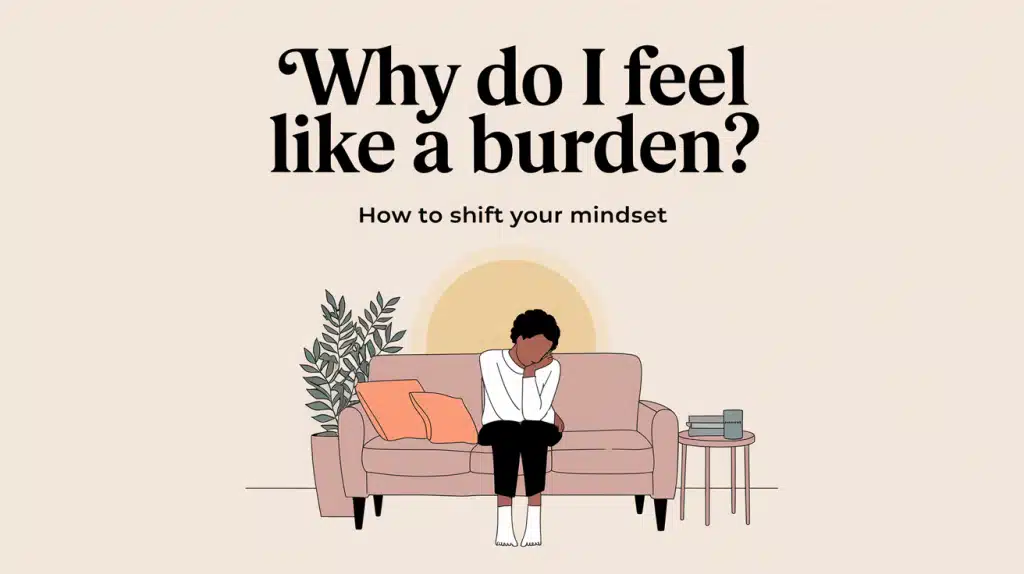Do you feel like a burden? This feeling hits when you need help, ask for support, or simply exist in someone’s life. The weight sits heavy on your chest.
You wonder if others would be better off without your problems. You hesitate to reach out. You apologize too much. You shrink yourself.
The good news? You can change this thinking. This post will show you practical ways to spot these thoughts, understand where they come from, and build a healthier view of yourself. You’ll learn how your brain tricks you and what to do about it.
You’re not alone in this feeling. And you’re definitely not actually a burden.
What Does “Feeling Like a Burden” Mean?
Feeling like a burden means believing your presence causes trouble for others. It’s the sense that you take more than you give in relationships and that others would be happier without you.
This feeling shows up in many ways. You might say sorry too often for small things. You hold back from asking for help even when you need it.
You downplay your problems to avoid “bothering” others. You feel guilty when someone helps you. You try to be as low-maintenance as possible in all your relationships.
These feelings can affect anyone. People with health issues often feel this way when they need care. Those going through tough times might worry they’re draining their friends. Even successful people can feel like they don’t deserve their spot at the table.
The Psychology Behind Feeling Like a Burden
1. Fear of Being “Too Much” for Others
Many people worry that their struggles make them a hassle for others. This fear often comes from self-doubt and the belief that we should handle everything on our own.
You might think, “I don’t want to bother anyone with my problems.” But the truth is the people who care about you want to support you.
2. Past Experiences Shaping Self-Worth
Your past can influence how you see yourself today. If you grew up feeling ignored, criticized, or told to “toughen up,” you might have learned that asking for help is wrong.
If past relationships made you feel unwanted, you might believe you’re a burden—even when that’s not true.
3. Societal and Cultural Influences
Many cultures value independence and strength. We’re often taught that needing help is a sign of weakness. This can make people feel guilty for leaning on others.
But in reality, human connection is built on mutual support. No one is meant to go through life completely alone.
The Emotional Toll of Feeling Like A Burden
1. Emotional Distress: Anxiety, Shame, and Isolation
Feeling like a burden often leads to overwhelming emotions.
- Anxiety – You might overthink every interaction, worrying that you’re bothering others. Thoughts like “Am I asking for too much?” or “Do they secretly wish I’d stop talking?” can play on repeat in your mind.
- Shame – You may start believing that your struggles make you less valuable. This shame can make it even harder to reach out for support.
- Isolation – Over time, these feelings can push you to withdraw from others. You might stop sharing how you feel or avoid social situations altogether, making the loneliness even worse.
2. Relationship Strain: Pulling Away from Loved Ones
When you think you’re a burden, you may distance yourself from the people who care about you—even when they want to help.
- You might stop opening up about your struggles to avoid “annoying” others.
- You may reject offers of help because you don’t want to feel like a problem.
- Friends and family may feel confused or hurt when you push them away.
The reality is that relationships thrive on mutual support. If you never allow others to be there for you, it can create emotional distance, even with those who genuinely love you.
3. Self-Sabotage: Avoiding Help and Opportunities
Feeling like a burden can also hold you back in life.
- Avoiding Help – You might refuse assistance, even when you really need it. Whether it’s emotional support, financial help, or career advice, you may convince yourself that you don’t deserve it.
- Missing Opportunities – You may hold yourself back from pursuing your goals because you fear being a burden to those around you. This could mean skipping therapy, not applying for a better job, or avoiding relationships that could bring happiness.
- Trapping Yourself in Struggles – By refusing help, you might stay stuck in difficult situations longer than necessary, making life even harder.
How to Shift Your Mindset and Stop Feeling Like a Burden?
Recognizing Distorted Thinking Patterns
Our brains can trick us with false beliefs about ourselves. You might think, “I’m always a burden,” when you’ve only needed extra help once. This all-or-nothing thinking makes one request for help feel like a lifetime of demands.
Your mind might jump to worst-case thoughts: “If I ask for help, my friend will get tired of me and leave.” This blows situations out of proportion. Your brain creates stories based on fear, not facts.
Look for words like “always,” “never,” or “everyone” in your thoughts. These hint at distorted thinking. When you catch these thoughts, pause. Ask: “Is this really true all the time? What’s the actual evidence?”
Shifting Perspective: Seeing Your Value Beyond What You “Give”
Your worth isn’t tied to what you do for others. You matter simply because you exist. This can be hard to accept when you’ve based your value on being helpful.
Think about the people you love. Do you value them only when they’re useful? Or do you enjoy their company, thoughts, and unique qualities? Others see you the same way.
Try this exercise: List five things people might value about you that have nothing to do with what you do for them. Maybe it’s your sense of humor, your kind heart, or how you see the world.
Replacing Self-Criticism with Self-Compassion
The table below highlights the shift from negative self-talk to a more compassionate and supportive mindset:
| Self-Criticism | Self-Compassion | How to Shift |
|---|---|---|
| “I’m such a failure.” | “I made a mistake, but I can learn from it.” | Acknowledge mistakes without defining yourself by them. |
| “I should be doing better.” | “I’m doing my best, and that’s enough.” | Recognize effort over perfection. |
| “I’m not good enough.” | “I am worthy as I am.” | Practice self-acceptance and affirmations. |
| “Everyone else is doing better than me.” | “Everyone has struggles, including me.” | Avoid comparisons and focus on your own journey. |
| “I always mess things up.” | “Mistakes are part of growth.” | Reframe setbacks as learning opportunities. |
| “I don’t deserve kindness.” | “I deserve the same kindness I give others.” | Treat yourself with the same care you show others. |
| “I’m weak for feeling this way.” | “It’s okay to have emotions; I am human.” | Validate your feelings instead of suppressing them. |
| “I’ll never be successful.” | “Success is a journey, not a destination.” | Focus on progress rather than outcomes. |
Rebuilding Self-Worth and Letting Go of Guilt
1. The Importance of Open Communication with Loved Ones
- Share your worries about being a burden – most friends have no idea you feel this way
- Prevent mind-reading by expressing your concerns clearly
- Tell them how you feel without expecting them to fix everything
- Simple conversation starters: “Sometimes I worry I ask too much of you.”
2. Learning to Receive Help Without Guilt
- Start small – accept minor help like someone holding the door
- Notice guilt when it appears, but don’t fight it
- Remember: People feel good when helping others – let them have that feeling.
- Aim for balance in your relationships over time, not in every interaction
3. Practicing Self-Affirmations and Gratitude
- Replace negative thoughts with positive statements daily
- Create three simple affirmations that counter your burden beliefs
- Say to them each morning: “I add value to others’ lives.”
- Note your contributions to relationships – being a good listener and remembering birthdays.
Overcoming the “Burden” Mindset with Support
When to Seek Professional Help
Some burden feelings run too deep to tackle alone. If these thoughts affect your daily life or stick around for weeks, it might be time to talk to someone.
A therapist can help you spot patterns you can’t see yourself. They offer tools built for your specific situation. Support groups connect you with others who understand exactly what you’re going through.
Watch for warning signs: feeling hopeless, losing interest in things you used to enjoy, or thinking others would be better off without you. These call for expert help right away.
Getting help isn’t weak—it’s smart. Just like you’d see a doctor for a broken arm, mental health deserves proper care, too.
- For those experiencing suicidal thoughts, please contact the 988 Suicide & Crisis Lifeline at 988
- For those experiencing abuse, please contact the Domestic Violence Hotline at 1-800-799-SAFE (7233)
- For those experiencing substance use, please contact SAMHSA National Helpline at 1-800-662-HELP (4357)
Finding Purpose and Self-Worth Outside of External Validation
Your value doesn’t depend on others’ opinions or how useful you are to them. True self-worth comes from inside.
Start by knowing what matters to you. What do you believe in? What makes you feel good about yourself? These internal standards give you a stronger base than always seeking others’ approval.
Try looking at your strengths and what makes you unique. What can you do that feels meaningful? Even small acts that align with your values build genuine self-worth.
Remember that you’re more than what you do or give. You matter because you exist, not because of what you offer.
Small Daily Practices to Reinforce a Positive Self-Image
Small steps each day add up to big changes in how you see yourself.
Keep a “proof” journal where you write down times when you added value or when others showed they cared about you. This builds evidence against burden thoughts.
Practice saying “thank you” instead of “sorry” when someone helps you. This shifts from guilt to gratitude.
Set aside five minutes daily for self-kindness. Speak to yourself with the same warmth you’d offer a friend.
Ask for small things regularly to practice receiving help without shame. Maybe it’s advice on a book or help carrying groceries.
Notice when burdened thoughts appear and gently question them: “Is this true? What would I tell a friend thinking this?”
These daily habits slowly rewrite the story you tell yourself about your place in the world.
Conclusion
We all worry about being a burden sometimes. This feeling doesn’t have to control your life or relationships.
Remember the key points we covered: Your worth isn’t tied to how little space you take up. Your needs are valid. Others often enjoy helping you more than you realize.
Start with small steps. Question those “always” and “never” thoughts. Practice receiving help on small things. Talk openly with trusted friends. These little changes build a new way of seeing yourself.
What’s next? Try one technique from this post today. Perhaps write down one thing you add to others’ lives. Or simply say “thank you” instead of “sorry” when someone helps you.
You deserve to take up space in this world—without guilt or apology.









